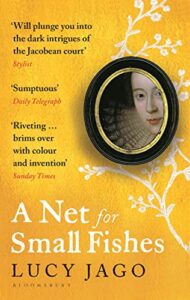
Ann Turner has a good life: Her husband is a successful physician at the court of King James I (and VI) who approves of her affair with a man closer to her own age (and who is the father of her three youngest children). She holds several patents, most lucratively on the dye to colour ruffs yellow and she has her own career, of sorts, in dressing and making up the women of the court.
This last brings her to the attention of Frances Howard, a noble teenager who has been married off, unusually for the time, to an even younger Earl of Essex, as a dynasty-building exercise. The Earl is an abuser and Ann is enlisted to hide the signs of beatings from the court.
Ann and Frances become friends, if a situation where one person is basically a servant can be called friendship. They get up to all kinds of unwise activities, but as long as Frances is very powerful, their actions are consequence-free.
Predictably, it all comes crashing down.
Ann’s husband dies and her oldest son, who didn’t approve of her affair, casts her out. Her lover, who had promised to marry her, drags his heels and then ghosts her. She is forced to move to much less desirable lodgings, and to become increasingly complicit as Frances engages in ever more risky behaviour.
Meanwhile, Frances has had her marriage to Essex annulled and been married to her lover, Sir Robert Carr. Carr (and this is important) is also the “favourite” of King James. Even if you don’t know your history, you should be able to figure out what that means. As the story is told from Ann’s point of view, this is never made explicit in the book. As James’s “favourite”, Carr is extremely unpopular at court. (This is also important). As a result of court intrigue, Frances falls out of favour at a time when Ann has gone from being merely socially inferior to Frances to completely dependent on her, as her other patrons at court abandon her.
Eventually every thing they ever did together blows up in their faces.
This book celebrates female achievement, ingenuity and friendship. There is a school of criticism which says that historical novels should only show women in the past as being completely downtrodden and that anything else is just wish-fulfilment. Two points to counter this: a) it’s fiction, so why not? b) women’s achievements have been deliberately erased from history, and if you look hard enough, they’re there. The book absolutely seethes with feminist rage at women’s powerlessness.
What other reviewers seem to have missed, though, is the class rage. Make of that what you will. Even Ann’s privileged life at the start of the novel is a house of cards: in order to keep their place, and jobs, in polite society, they have to spend way more money than they can afford, and this is part of her downfall after her husband’s death. The book is absolutely scathing about court life, the pettiness and hypocrisy, and most of all anger at the arbitrariness of the King’s favour or lack thereof.
Too much historical fiction completely glosses over this aspect of the past. This is how you can tell that Jago has a background as a proper historian.
I liked this book very much. It made a change from my usual fare of urban fantasy and crime novels. It’s about women’s interior lives without being too focussed on the domestic. The prose, while not completely captivating and magical, was engaging enough that I kept turning the page to see what happened next.
I didn’t realise till I read the author’s note at the end that it is based on true events. In my defence, this is not my period. (In a past life I was a medievalist, specialising in early medieval Britain and Scandinavia).
